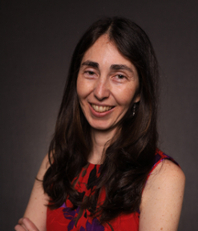Q & A with Tatiana Hurtado de Mendoza

Tatiana Hurtado de Mendoza, Ph.D., is an assistant professor in residence in the Division of Surgical Oncology. Her research interests include virology, immunology, immunotherapy and translational cancer research. Hurtado de Mendoza, along with Chris Benedict, Ph.D., recently received a Curebound grant to further their breast cancer research. She also serves as a mentor to undergraduate, graduate and medical students.
April 29, 2025 | Interview by Oluyemisi Bolonduro
Where did you grow up?
I was born in Guatemala, and a year and a half afterwards, my family moved to Madrid, Spain. It’s a big city with so many cultural activities. It was really nice.
What brought you to UC San Diego?
The caveat of a career in Spain is there were not a lot of opportunities for lab experience. I first came to UC San Diego on a research associate position with Dr. William Loomis because I wanted to broaden my lab experiences. His lab studied an amoeba that developed into a multicellular organism. It was interesting, but I always wanted to do translational research on cancer. So, I moved to a lab that offered me the possibility to do so. At the same time, I started auditing classes, and I was like, “Oh, I really like this. I would like to do a Ph.D. here.” So, I joined UC San Diego’s Biological Sciences Ph.D. Program and Dr. Inder Verma’s lab at The Salk Institute for Biological Studies.
What did you research during your Ph.D.?
My Ph.D. was on an anti-apoptotic molecule called lifeguard, discovered in the Verma Lab. Anti-apoptotic molecules prevent cell death, and the lab thought it could have implications in cancer research. We found out that lifeguard was important for T-cell development and antiviral memory response. That’s where I started my virology and immunology work.
You recently received a Curebound grant for breast cancer research. Can you tell me more about that?
The research that Dr. Chris Benedict, my collaborator at the La Jolla Institute for Immunology, and I are doing is leveraging the pre-existing immunity that we have against viruses and using that to attack tumors. The first time we started to put this in practice was in models of pancreatic cancer. Prior to pancreatic tumor implantation, we used cytomegalovirus (CMV) to infect specimens. We chose this virus because it's very prevalent in humans — a lot of people already have CMV immunity. CMV also induces a very strong T-cell response that grows with age. The strategy includes delivering CMV antigens to tumors. Then the anti-CMV immunity will be able to fight them. Dr. Benedict and I got a lot of good preliminary data in the pancreatic cancer model that we wanted to apply to breast cancer. So, we wrote the Curebound grant, and we’re very excited to start the project!
Why do you feel the work you do is important?
The work that I'm doing right now is kind of high risk, high reward, because we can end up with nothing. But if it ends up working, I think it can provide a new perspective on cancer treatment. My vision is that a patient comes in and gives you a sample of their blood. Then, you can run that sample against a panel of antigens from viruses that generate strong immunities. From there, you can find out which of them the patient’s T-cells react best against and use these peptides to treat tumors. If this works, it is an approach that may be applicable to many tumor types, regardless of genetic alterations. I hope to find a therapy that is affordable for everybody and can only rely on the immune system, not so much on chemotherapies that are more toxic.
Do you have any advice for future researchers?
I think it's important to believe in yourself and in your ideas because some people thought that my ideas were crazy and they weren’t going to work. If I had gotten discouraged by that, I would have never done it. I'm a very instinct driven person, and I believe that if you think something's right, you just have to try it. I'm also one that doesn't give up easily. So, I think it's worth giving it your all for an idea that you think is worth it. Then, if it doesn't work, it doesn't work. But I think you cannot regret that you didn't try.
